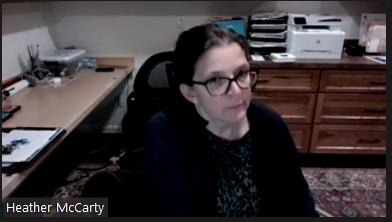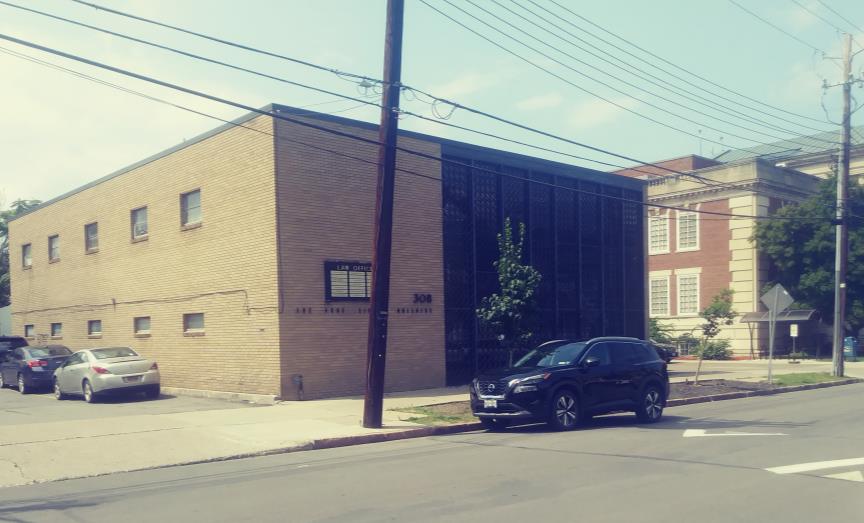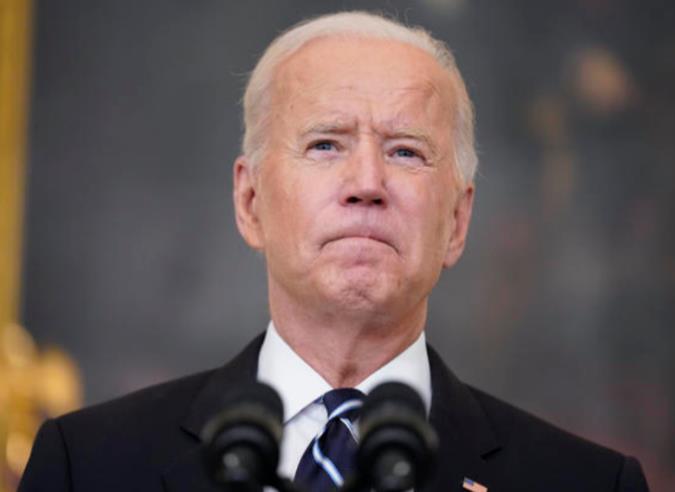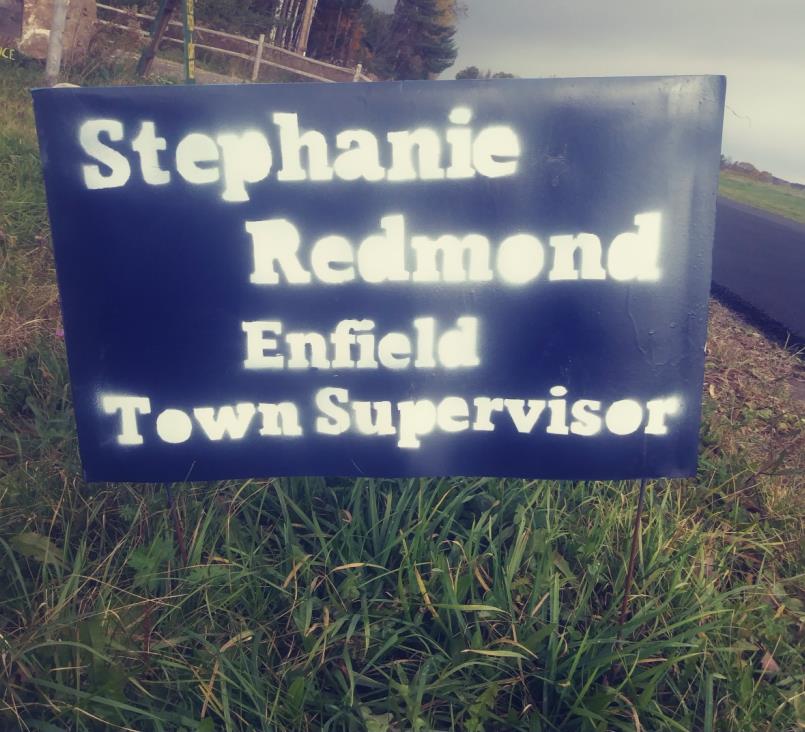DA: Murder suspect known in Godfrey killing, jailed elsewhere
by Robert Lynch, November 30, 2021
With unexpected candor, during an online forum to discuss gun violence in Ithaca, Tompkins County District Attorney Matthew Van Houten revealed Tuesday night (Nov. 30th) that police think they know who killed Ithacan Alan Godfrey July 20th in Ithaca’s West End. Van Houten said the unnamed suspect is being held in another community on a different charge, and that a local grand jury could hand up an indictment for Godfrey’s killing as soon as January.

“To say it (Godfrey’s murder) is unsolved is not true,” Van Houten said in response to Ithaca Alderperson George McGonigal’s request that the D.A. tell him on the spot “what’s going on” with what McGonigal surmised was the unsolved killing of Godfrey, which he described as an “execution style murder.”
“There has not been an arrest,” Van Houten acknowledged, “because we are being extremely thorough and careful.” But the prosecutor quickly added, “We know… we know who did it.”
Van Houten continued, “That individual (namely, the suspect) is not in the community right now. He is incarcerated on another charge that came out as a result of the investigation that (the Ithaca Police Department) was doing.”
The D.A. told McGonigal and the nearly 50 online attendees of the Democratic Party-sponsored forum that “when we have turned over every stone, going into the grand jury, and that’s what’s going to happen, it (likely an indictment) will probably happen in January.”
McGonigal said he appreciated the update.
Van Houten admitted that building the case against Godfrey’s alleged assailant demands care, precision, and a degree of inference. “It is a case that is a circumstantial case in a sense that, yes, there is video surveillance, and there’s a lot of circumstantial evidence.”
According to Ithaca Police, 32-year old Godfrey, African-American, was shot dead at about 12:45 the morning of Tuesday, July 20th near the intersection of Taughannock Boulevard and West Buffalo Street. Police described Godfrey’s death as a targeted killing, not a random shooting. But police have disclosed few details of the incident, either then or since.
Van Houten’s disclosure at Tuesday’s forum provided by far the most evidence to date.
“We’ve been communicating with (Alan Godrey’s family) and keeping them in the loop,” Van Houten assured the forum’s attendees, adding that family members support his office’s decision to be “thorough and careful.”
With equal candor to that of his disclosure about the investigation’s progress, the D.A. revealed Tuesday he’s chosen to hold back some information on the Godfrey case fear of poisoning the local jury pool. Moreover, he said, a prosecutor must not only secure a conviction, but also “make sure that the process happens so that there’s no legal mistakes; so that the jury pool isn’t tainted; so you know the defendant has a fair trial, and there’s no appeal issues.”
To accord some consolation to the victim’s family and to assure them the suspect is jailed elsewhere, Van Houten told the forum he’d thought at times it’s “probably important to put something out,” meaning public information.
Then the D.A, quickly added, “But you know frankly I don’t trust our local media to get it right…. I don’t want to screw it up for the long run,”
****
Postscript to my reporting:
Posted December 1, 2021
To my Readers:
I fully expect official pushback—possibly, big time pushback— to the facts I have reported here, those providing significant new details into the Alan Godfrey murder investigation. No doubt, some would have preferred I’d remained mum and kept this secret to myself. Nonetheless, as I will explain, I stand by my reporting.
Tompkins County District Attorney Matthew Van Houten’s comments came Tuesday, Nov. 30th at a community forum that the Tompkins County Democratic Committee (TCDC) invited me to attend as an elected Democratic office-holder. No, it was not a public meeting. But neither was its attendance so restricted as to constitute an off-the-record briefing. Perhaps its definition lay somewhere in-between. I chose to place it where I thought it best lay and to provide the public’s right to know the benefit of the doubt.

I counted as many as 47 attendees participating in the two-hour online forum. With that many in the zoom-room, the session in my opinion became quasi-public. Van Houten’s words would leak. Best they be reported accurately and first-person, not through the second-hand social media rumor mill. And to my knowledge, nothing that the District Attorney said that night would break any law if reported. We attending that night were Democratic Party leaders and office holders, not grand jurors, police investigators, or officers of the court. Had Matthew Van Houten believed the information he imparted would somehow compromise his investigation into Alan Godfrey’s murder, frankly, he shouldn’t have spoken them to so many of us in the forum that he chose.
But full disclosure here: The Party’s “”Community Response to Recent Gun Violence” forum chose to restrict its participation to “TCDC members, Democratic elected officials in the County, and active Democratic volunteers ONLY” (emphasis in the original). Organizers added that “This is explicitly not a public meeting, and no media will be allowed. It is an internal, education and strategy-oriented event aimed at our team.” Members were instructed not to share the meeting link. And I did not, either prior to or during Tuesday’s meeting.
But the premise for the TCDC forum raises issues of its own making. In defining the forum’s purpose, the invitation stated, “Local media can be either hysterical or missing entirely in covering gun violence locally.” It continued, “Rumors abound on social media. This event is intended to provide close-to-the-people information that is accurate and detailed about both the gun violence that has transpired recently, and also how elected officials and constituents have been reacting to it.”
To me, such heightened “we know best” arrogance stands antithetical to democratic ideals and totally inappropriate and unacceptable when it comes from any respectable political organization. To the contrary, a free, unshackled, independent media serve as guardians of the public interest, of democracy. And of all persons, our critics are Democrats. They are not the ones whose national political leader has chastised reporters as being “enemies of the people.” Yet, here, in Greater Ithaca and Tompkins County, perhaps Democrats regard journalists as public adversaries.
Trust me; there was much newsworthy meat offered in that two-hour forum to explore our rash of local gun violence. I would love to report it. Perhaps someday I will, but not now. (I have good notes and a transcript.) What was said deserves to be made public. At times, Tuesday’s speakers affirmed and validated my own viewpoints, those I’ve previously expressed here and for which I’ve been publicly criticized for even suggesting. Other comments Tuesday left me bewildered and angry at how far certain of our elected leaders have strayed in posturing themselves above the rest of us and in bristling at the first whiffs of deserved blame their critics might choose to assign them.

Yes, it would make one heck of an essay. Maybe, someday you’ll read it. But for now, I will respect the TCDC’s preference to toss a drop cloth of secrecy over much of this event. Nonetheless, I ask the Party to open the video transcript to coverage. It should do so; providing, that is, that the organization still espouses a proclaimed purpose of advancing free speech and open debate.
Until that moment, however, I will restrict my coverage of the “Community Response to Recent Gun Violence” forum to just this one, highly newsworthy revelation about the progress in finding Alan Godfrey’s killer. As they say in the news business, the public’s right to know demands it.
Bob Lynch
###
Newfield holds off vote on opt-out law
by Robert Lynch, November 18, 2021
It was, in a word, “anticlimactic.”
For nearly two and a half hours Thursday (Nov. 18th), the Newfield Town Board moved ever closer to the one vote everyone, no doubt, most awaited: whether the Board would move forward to opt-out of a new state statute and thereby ban cannabis dispensaries and pot lounges from the limits of its town.

But the moment never came—not really. Near meeting’s end, after shuffling the agenda and clearing everything else out of the way, Supervisor Michael Allinger put a possible “Opt-Out Law” to nothing more than a straw poll of his colleagues.
Who wants to opt-out, he asked. Three hands were raised, including Allinger’s own (plus those of Councilpersons Joanne James and Christine Laughlin.) Who’s opposed to opt-out? The hands of Board members Casey Powers and Heather McCarty shot up.
No fights. No further discussion. And maybe we in Enfield could learn from what Allinger said next.
“I think it’s too close to putting it to a vote,” the Supervisor said in a bow to civility. “Let’s table it until the December meeting”.
Diplomatic, perhaps. But also cutting things really close. State law dictates that if a town opts-out—effectively banning pot sales within its limits until further notice—it must adopt that law by the end of December. The Newfield Board meets December 9th. Even if it were then to initiate opt-out legislation, the law would need to be written, newspaper notices published, and hearings held. The schedule would be doable, yet tight, especially with Christmas in the mix.
Though its members tossed about the prospect of opt-out briefly in October, the Newfield Board stands far from making its intentions clear. If one were to bet based on current sentiment, the opt-out measure might likely pass—by just one vote. But Allinger’s hesitancy to move further Thursday suggested positions may yet change.
Enfield, by contrast, held extensive Board discussion of its own opt-out options November 10th. . And it’s scheduled a December 8th Public Hearing on its draft opt-out law. At least three Enfield Board members (including this writer) have voiced likely support of an Enfield opt-out, if nothing more than to keep future options open, given the fluidity of current state regulation and the potential legal, commercial, and public safety pitfalls that may confront whichever municipality goes first in sanctioning marijuana sales.
In Newfield’s case, it’s best left said, “See you in December.”
“No fair,” this writer (and Enfield Councilperson) emailed one Newfield official at meeting’s end. “You’re making Enfield go first.”
****
Perhaps the more significant development Thursday saw the Newfield Board move forward with nearly $6 Million in combined water and sewer system improvements.
Following a pair of uneventful, yet legally-required Public Hearings, the Board declared both the water and sewer system upgrades “in the public interest,” and authorized the issuing of bonding for each.
But one important stipulation Councilperson Laughlin requested everyone make clear. Proceeding with either project stands conditioned on the future award of outside grant money to help with the expense.
“There are costs for this project that will be beyond the Town’s reach,” Allinger acknowledged regarding the $4.8 Million water system upgrade. He indicated the same holds true for the $1.11 Million that would be spent on sewers.
Yet Allinger, like others, affirmed both projects’ need, especially the modernization of Newfield’s water system, first constructed in 1968.
“The infrastructure is over 40 years old. We’re looking at something that’s long overdue,” said Allinger. “This is something that’s an important topic for us, and something we need to take action on.”
Newfield’s sewers are a bit newer, constructed in 1983. But there the problem is pollution.
“It was brought to our attention by the DEC (Department of Environmental Conservation),” Allinger said, “that the flow to our leach field is higher than permitted.”
Both the proposed water and sewer system upgrades target a life span of another 40 years. The Town hopes New York State will spring for the cash.
###
One night; two votes; $4.8 M for new County Offices
by Robert Lynch, November 16, 2021; additional reporting November 17, 2021

The Tompkins County Legislature doubled-down on its plans Tuesday to build a new County Office Building. And approximately half of its members made clear that the $30 Million building is, indeed, what they plan to build.
In a pair of votes that, coincidentally, fell onto the same meeting’s agenda, lawmakers first approved, without dissent, a 2022 County Budget that allocates $1.8 Million for the new offices’ design. Then, more significantly, the Legislature transferred $3 Million from the County’s fund balance to buy the two properties on which the building would stand, namely the Key Bank and Wiggins’ offices next to the Courthouse.
“The purpose is clear. Our purpose is for a building that will hold County offices,” proclaimed outgoing Dryden legislator Martha Robertson, who joined five of her colleagues in beating back one member’s amendment that would have qualified the land purchase as being for a “potential” Downtown County Governmental Office Building, while not necessarily carrying forth a clear intent to build.
Danby legislator Dan Klein’s amendment secured plurality support among seven legislators, but did not find the eighth vote majority needed to pass. (Member Leslie Schill, attending remotely, had connection problems and did not participate in that vote or several others.)
“These properties are an excellent investment,” asserted Klein. “If at some point in the future the County did not need these properties as we thought we might, then we can sell these properties and there’s a very good chance we will not only get our money back, but actually make a profit.” While supporting County Government’s need for added space and citing the “very cramped conditions” confronting the current workforce, Klein sought to keep options open, a position that failed to score points with some others.
“Putting in the word, ‘potential’ suggests an alternative. And if there’s an alternative, I don’t know what it is,” responded Rich John, who called the office building project a “sensible, good step for us as a County Legislature to take.”
“I don’t think we should hedge our bets,” said John. Buying the land for a building, he said “is exactly what our intent is, and we should say so.”
A keen observer might wonder whether legislators would have more than quietly affirmed the land purchase had not Enfield Councilperson Robert Lynch (this writer), a frequent critic of the building project, not prefaced Tuesday’s meeting with a pointed and impassioned Privilege of the Floor comment criticizing not only the lack of financial footing for the office endeavor, but also the two-year long chain of secret legislative meetings that produced the finalized deal.
“Tonight, you’re proposing spending, reallocating $4.8 Million,” Lynch told the Legislature. “You didn’t lead the public along, and I think to a certain extent you shouldn’t do this because of what you didn’t do, which was to inform the public.”
Lynch also referenced the years-ago warning of former County Administrator Joe Mareane, who’d once considered transforming the now-demolished Old Library into a Center of Government, but scuttled the idea because he couldn’t make the numbers work.
“I can’t make a business case for it,” Lynch recounted Mareane as saying. “And nobody here’s made a business case for this project,” Lynch said.
“These are legitimate questions and concerns from the public that we should be able to give answers to,” Klein responded hours into Tuesday’s meeting as he acknowledged the Enfield lawmaker’s concerns and offered his own failed amendment. Klein justified that marathon of executive sessions—which Lynch had termed an “odyssey”—by the delicacy of the purchase negotiations and the fear that disclosure might hike the properties’ price.
“The question of a business case, that was discussed probably in 2010 or ’11,” recalled Dryden’s Robertson, who maintained the times have changed.
Then, she said, “We were just coming out of the Recession… when we were really cratering. At that point, it didn’t make—there wasn’t a business case, but a lot has changed in ten years.”

Robertson noted that the State is now pressuring the County Clerk and District Attorney to vacate the Courthouse. “So I think it’s only fair to the public to say this (the new offices) is actually what we’re going to do with the land,” said Robertson. “We’re not going to build a parking garage,” nor “bank the land.”
Enfield’s two County legislators split their votes on Klein’s amendment; Anne Koreman supporting greater flexibility, Dave McKenna opposing it. Only the Ithaca Town’s Amanda Champion opposed the final fund transfer Resolution.
Should County lawmakers move forward with the building project, ever-escalating in cost, they would likely raze both the Key Bank and Wiggins’ offices, along with County-owned “Building C.” However, Dryden legislator Mike Lane suggested Tuesday that the existing mid-60’s-era structures might be retro-fitted by their new owner and used for a while.
“I did what needed to be done,” Councilperson Lynch said after Tuesday’s vote. “I provoked conversation. I joined the issue. I prevented just another perfunctory, debate-free, rubber stamp of a vote. For those reasons, I succeeded. Now on to the next chapter.”
****
As the County Legislature adopted its zero-tax increase next year’s budget Tuesday, it left unresolved how—or whether—to replenish more than $454,000 syphoned out of an earlier-promised $7 Million Community Recovery Fund. The local fund had been intended to underwrite human services projects that might otherwise deserve federal relief under the American Recovery Plan (ARPA). Legislators drew down the $454,000 during weeks of budget review to pay for departmental and agency add-ons—so-called Over-Target Requests—tacked onto the budget. The Legislature earlier redirected the ARPA money itself to fund governmental operations.
Running low on emergency cash near year’s end, the Legislature moved $1.6 Million from its fund balance to its contingent fund. But at the same meeting, lawmakers withdrew some $600,000 from that contingent account to fund, among its uses, an inordinately high number (11) of Sheriff’s Department disability cases and terminal pay for eight employees who’ve left that department.
And filling a key administrative vacancy, the Legislature appointed Roxan Noble to replace the retired Mike Hall as Airport Director. A 32-year career employee who rose through the ranks, Noble has served as the Airport’s Deputy Director.
###
Nothing Much Changes
Absentee Votes Cement Redmond, Brown Election Day victories
by Robert Lynch, November 16, 2021; updated November 17th @ 12:40 AM
Absentee ballots, counted at the Tompkins County Board of Elections Tuesday (Nov. 16th), failed to yield surprises in any of Enfield’s or Newfield’s local elections. In fact, not enough absentee ballots came back to have ever flipped the Election Night results even if the mail-in vote had proven lopsided.

The 44 Enfield absentee ballots counted, plus another 65 cast in Newfield, confirmed what the earlier machine totals had indicated: Stephanie Redmond will serve the next two years as Enfield Supervisor, and Republican Randy Brown will succeed Dave McKenna in representing Newfield and southern Enfield on the Tompkins County Legislature.
Based on this writer’s in person observation of absentee vote counting Tuesday morning, Democrat Redmond, the only Supervisor candidate listed on Enfield’s ballot, secured 21 of the 44 absentee votes, bringing her combined total to 363 (49.3%). A write-in candidate or candidates—not named, but presumably Cortney Bailey, the only declared write-in candidate for Supervisor—gained three votes, bringing the write-in total to 208 (28.2%). An additional 20 absentee ballots designated no candidate at all for Supervisor, bringing the “none of the above” tally to 166 (22.5%).
In fact, in one outright symbol of defiance, an unidentified absentee voter, in a ballot shown this writer, emblazoned his or her submission with the word “No” scrawled in large letters within Redmond’s Supervisor’s box. That voter may not have been aware of a competing candidate running when he or she cast the ballot.
The absentee results keep Supervisor Redmond as the election’s winner, but with support remaining at (just) under 50 per cent.
In the District 8 race for Tompkins County Legislator, Republican Randy Brown’s election night lead shrunk slightly, but still broke 50 per cent of the vote, just barely. Losing in Enfield, but making up the difference on his home turf of Newfield, Brown’s 41 additional absentee ballots raised his total vote count to 787 (50.0%), compared to Democrat Vanessa Greenlee’s 687 (43.6%) and Independent Democrat Robert Lynch’s (this writer’s) 81 votes (5.1%). Greenlee actually won support from 10 more absentee voters than did Brown. Lynch had suspended his campaign after his June Democratic Primary loss, yet kept his name on the November ballot.
The lone nail-biter among this year’s contests for the Tompkins County Legislature will take another week to play itself out. But it’s already taken a new twist. Legislator Mike Lane, whose District 14 includes eastern Dryden, revealed at the Legislature’s Tuesday night (Nov. 16th) meeting that a Monday count of 78 absentee ballots had flipped the candidate lead, but left him, Lane, with only a razor-thin advantage.
Whereas Republican Challenger Thomas Corey had led incumbent Democrat Lane by 20 votes Election Night, the absentee count now places Lane in the lead by just two votes. Lane said a Corey-backed court challenge remains possible. Meanwhile, County elections officials plan to perform a full recount of the District 14 ballots beginning Monday, November 22nd…. that is, if the courts don’t step in first. Before the absentee count, Corey had led Lane 838 votes to 818.
But back to Enfield, absentee voters proved more accepting of the three Town-wide ballot issues decided this election Yet in no instance did the absentee votes tip the scales of Election Night, in which all three ballot proposals to lengthen future terms of office for elected officials went down to defeat.
Ballot Proposition 6, which would have doubled the length of Enfield Supervisor’s terms beginning in 2024 from two years to four, actually won support among absentee voters (25 votes to 16), and yet lost in the overall count, 237 votes (44.2%) in favor to 456 votes (65.8%) opposed. A proposition to similarly extend the terms for Highway Superintendent lost 301 to 393. The third proposition, that would have also extended the Town Clerk’s terms to four years, lost 292 votes in support to 403 opposed. Like the votes for the Supervisor’s proposition, absentee ballots swung in the latter propositions’ favor (25 votes to 18 for Highway Superintendent; 28 to 15 for Clerk.)
Campaign strategy may partially explain any disconnect between the absentee voting results and those of the machine tallies. The campaigns against the terms of office changes began late in the election cycle. So, too, did Cortney Bailey’s write-in campaign for Supervisor, even though Bailey had declared for Enfield’s top Town office in the spring, yet failed to make the ballot due to a technicality. Voters who may have mailed their absentee ballots early may have been aware of either effort.
Absentee vote counting sometimes draws all candidates and party leaders to the Board of Elections’ proceeding, but not in Enfield’s case. Perhaps due to the unlikelihood of an upset, only this writer (and candidate) attended Tuesday’s tabulation. He both represented himself and stood in for Ms. Bailey at her request.
###
Final Call: Vaxx mandate dies in Enfield
by Robert Lynch, November 11, 2021
Joe Biden wants every employee vaccinated or else tested weekly for COVID-19. Stephanie Redmond, Virginia Bryant, Jude Lemke and James Ricks do not.

By their failure to second a remaining member’s motion Wednesday (Nov. 10th), Supervisor Redmond and her three Town Board colleagues killed—for a second and final time—a proposed employee vaccination or testing mandate for the Town of Enfield. Its sponsor, Councilperson Robert Lynch (this writer) thereafter told the Board he will not raise the issue again.
In September, the Enfield Board rejected, three votes-to one, with Lynch its only supporter, the Councilperson’s previous attempt to impose a vaccination mandate affecting Town officers, employees and the Board’s own members. Lynch’s earlier Resolution was broader. It would have included mandating booster shots, re-inoculations to which Redmond strongly objected. Wednesday’s retooled Resolution jettisoned the booster shot requirement. It stated only that the Board “makes no policy determination regarding any booster shot requirement… until such later time as it determines appropriate.” Of course, by its inaction Wednesday, the Town Board made no policy determination at all.
“I believe vaccines save lives,” Lynch said after Wednesday’s marathon, action-packed meeting. “And I believe employers, including Towns, have the obligation to protect the lives of their workers.”
Renamed as “a Resolution to Establish a Vaccination or Testing Choice Option Policy for Public Officers and Employees of the Town of Enfield,” Lynch’s latest proposal, similar to the national mandate imposed by OSHA (but currently facing a court challenge), would have required within 60 days of adoption, employees either document their valid vaccination status or else subject themselves to weekly COVID-19 testing at municipal expense. The proposed policy made clear that its covered personnel maintain “their right to opt-out of COVID-19 vaccination should they so choose.”
At Lynch’s urging, the Tompkins County Legislature earlier this fall agreed to underwrite financially the employee testing program and bring local municipalities under the County’s testing umbrella, thereby eliminating any cost to Enfield. Several other local municipalities have already availed themselves of the County program. But Enfield, by Wednesday’s inaction, will not.
“I tried my best.” Lynch said after Wednesday’s meeting. He advised the Board he had resubmitted his once-failed employee mandate because President Biden had September 9th issued the national vaccination directive, one affecting larger employers, and done so only one day after the Board had rejected the Enfield Resolution. Lynch thought the President’s action might prompt a local change of mind.
“I firmly believe I am my brother’s keeper,” Lynch said. “But the anti-vaxx movement remains alarmingly strong in Enfield. Wednesday’s lack of action proved it.”
****
Wednesday’s Town Board meeting proved one of the most active in Enfield’s recent memory. One could have written four or five lead stories from it. During its nearly four-hour session, the Town Board:
- Rejected a revised Open Meetings Policy Resolution, thereby assuring the Town Board’s majority prefers advisory committee meetings to be closed to the public;
- Adopted, unanimously, a controversial Resolution that stepped close to taking sides with the “traditional” faction of the Cayuga Indian Nation in its leadership dispute with a rival faction; yet the Board stopped short of endorsing a follow-up measure that would have asked the New York Attorney General to investigate recent acts of violence at the Nation’s Seneca County properties;
- Debated, equivocated, yet agreed to set a December Public Hearing on a possible opt-out law that would ban marijuana dispensaries in Enfield; and
- Although effectively buried within its weighty agenda, adopted the 2022 Town Budget.
Open Meetings: If anyone doubted that Supervisor Redmond’s penchant for governmental secrecy extends to most of her colleagues, that uncertainty vanished by meeting’s end. With equally swift and certain dispatch, Redmond and Councilpersons Bryant, Ricks and Lemke dealt death by silence—just as they had with the vaccine mandate—to Lynch’s proposal to “Reaffirm Open Government in the Town of Enfield.”
“Resolved, that the Enfield Town Board hereby establishes and reaffirms as a matter of Town Policy that all meetings of its Town Board, its Planning Board, and all advisory committees… are to be considered Public Meetings and open to attendance by any and all,” Lynch wrote in his draft Resolution, which like his vaccination mandate minutes earlier, died for lack of a seconding vote.
In contrast to a similarly-rejected measure Lynch had tendered in October, Wednesday’s briefer, more focused Resolution skirted the question of whether additional Town Board members could join committee discussions, a circumstance in which extra attendees could create a Town Board quorum.
Lynch maintained the policy statement merely reaffirmed past open-meetings practice. It responded to an October 19th email exchange in which the Supervisor had informed Lynch that, “Having residents who are not informed of the work of the committee show up to meetings is not appropriate as it is more disruptive than productive.” In a reply, Councilperson Lemke had affirmed the Supervisor’s position. Wednesday’s Resolution sought to overrule the Redmond-Lemke posture.
“You have stated your policy by your silence,” Lynch wedged into the discussion following the Town Board’s silent rejection. He promised to resubmit his measure in January when a new member will join the Town Board.
****
Cayuga Nation: Brought back for consideration for a second straight month, the Town Board adopted, unanimously, a much-revised Resolution that stepped only as far as the Board dared go toward endorsing Chief Sachem George’s “traditionalists” in their ongoing leadership dispute for control of the Cayuga Indian Nation.
Though other lawmaking bodies—most notably the Tompkins County Legislature—have declined to touch the issue that Enfield tackled head-on, Enfield lawmakers found themselves lobbied heavily by local activists; their group, Anti-Racists in Enfield; and Sachem George himself.

On the East Shore; Cayuga Nation Gas/Convenience Store near Union Springs, Cayuga County
The heavily-reworked Enfield Resolution, adopted Wednesday, urges the Federal Bureau of Indian Affairs to “take a proactive role in protecting the traditional Cayuga Nation’s citizens, by undertaking a thorough investigation” into the February 2020 property destruction at the Cayuga’s’ Seneca County properties. It further urged federal authorities to commence “reassessing the competence and effectiveness” of Clint Halftown’s rival faction that now controls the Nation as its “Federal Representative.”
Councilperson Lynch, who’d declined to commit himself prior to Wednesday, acknowledged he’d endured “agony” this past month in deciding his vote, “torn in different directions,” he said, between respected constituents who saw the destructive acts as warranting intervention and those, equally persuasive, who’d warned Board involvement itself could break the law.
“If I were acting in a vacuum,” Lynch told the Board, “If I were the Town of Enfield Board by myself, I probably would say I’ve got to stay clear of this because it’s really outside our borders.” “And if we start dealing with issues that lie outside our borders, he added, “pretty soon we’ll be dealing with the Wiegers in China and the Palestinians in Gaza and people in Texas who want an abortion. And we really can’t do that. We have to pay attention to Enfield matters.”
Yet Lynch admitted he doesn’t act in a vacuum, but as one Board member of five. And he relented to make the vote unanimous because, he said, the Board “should speak with one voice.”
But what followed that vote, no one but Lynch had expected. The previous holdout Councilperson next introduced a second, more pointed Resolution. It sought to join Seneca County’s own call for a State Attorney General’s investigation, including appointment of a special prosecutor, to probe both a Grand Jury’s indictment of a non-Indigenous resident stemming from an altercation with Cayuga Nation police, and also the February 2020 bulldozing of those Cayuga Nation buildings. The Resolution would perhaps extend the appeal to Albany beyond what even Seneca County Supervisors had requested.
The surprise Resolution caught many at the meeting off-guard. Members at times voiced sympathy for the unexpected initiatives; but at other moments, feared overreach. Councilperson Lemke questioned whether outside authorities could even enforce New York law on Cayuga Nation land.
“In my opinion,” said Lynch, “the Seneca County law enforcement community and its leaders have been so woefully negligent in this matter.” Lynch, a paralegal, said a felony charge of criminal mischief, second degree “fits like a glove,” and that “any layperson” could find probable cause to indict.
Monday, November 8th, Seneca County District Attorney Mark Sinkiewicz confirmed to Lynch directly that “There was not a Grand Jury action taken for the February destruction of the buildings.”
“It should be prosecuted. It was not prosecuted, and I think the Attorney General has to become involved,” Lynch told the Enfield Board.
On November 4th, David Ettman, Seneca County Attorney, at the County Board of Supervisors’ request, wrote Attorney General Leticia James, stating, “The Board seeks an independent review of all the facts and circumstances related to both February 2020 incidents, and the interaction with the federal, state, and local officials, which has apparently led to only one local prosecution and no action by the Cayuga Indian Nation.”
The non-Indigenous man prosecuted, Charles Bowman, attended Wednesday’s Enfield online meeting. He spoke briefly, endorsing Lynch’s call for an A.G.’s review. But some on the Town Board were hesitant.
“I’m not familiar enough to really comment on this or am I prepared to vote,” said attorney Lemke. “It was action on Cayuga Nation land by Cayuga citizens. I’m not sure what authority the Seneca Police would have, given that it’s a sovereign nation”
“I see a grave injustice here,” Lynch responded. “I regard people who are Native Americans as American citizens. I presume they do have the right to vote. If they have the right to vote, they are American citizens and should be subject to American law.”
“Actions on that February day were just incredibly repulsive and damaging,” said Councilperson Bryant. But Bryant also warned, “I’d hate to create a firestorm” by the Resolution’s adoption.
“I am equally appalled with the actions of this police force,” Supervisor Redmond agreed But she, too, urged delay to allow “various groups to have a moment to review this.”
Lynch’s Resolution to refer the matter to the A.G. was then tabled until at least December.
****
Marijuana Opt-Out: Though some Board members signaled they had very little heart in it, the Enfield Board Wednesday advanced to Public Hearing a proposed Local Law that would exercise the opt-out clause of the New York’s marijuana legalization law, the so-called MRTA. Any opt-out would ban cannabis dispensaries and lounges—at least temporarily—within Enfield’s limits.

MRTA’s strict deadlines require adoption of any opt-out law by the end of December, but not thereafter. The Enfield Board set its opt-out hearing for December 8th.
Board members invited public comment on the issue Wednesday, but found themselves talking more with each other than with residents.
Prevailing Board sentiment at this early stage appears to favor an initial opt-out from the law, but the Board doing so only to allow the State more time to clarify its regulations. Once that’s done, the Town might opt back in.
“I would push to say let’s opt out and give ourselves a few months and think about it,” suggested Lemke, “and actually have a more robust conversation.”
“I agree with Jude,” concurred Councilperson Bryant. With minimal rules from Albany, Bryant analogized, it’s “trying to fish without a hook; not knowing what you’re going to get.”
“I wonder if the drafters of the Comprehensive Plan would have said we should be encouraging marijuana bars and marijuana dispensaries in Enfield?” Councilperson Lynch questioned. “I kinda’ doubt it.”
Lynch also noted that the former Kuma gentlemen’s club is for sale, and he suggested the location is prime for a pot bar, prompting his fear that patrons from Ithaca might smoke there, “get stoned,” and then head back home impaired while drivers like him are driving in the opposite direction up Route 79.
But Supervisor Redmond, perhaps the Board’s most eager supporter of cannabis dispensaries and the revenues they would generate, raised the double standard.
“If we are going to regulate on-site consumption because we are concerned about people driving afterward, are we also going to stop bars from happening here because we’re concerned about drivers after they drink?” Redmond asked.
Commenters could only identify one current Enfield bar, namely at the Hillendale Golf Course. And Hillendale doesn’t operate year-round.
Councilperson James Ricks, like Redmond, fell in on the side of allowing dispensaries. He said Enfield marijuana use is already pervasive.
“I’ve seen them do it right here,” said Ricks. “So they go to Syracuse, they buy all their equipment, and they go wherever they want to go and do it…. I don’t think opting out is going to change the terrain.”
But Ricks and others saw possible advantage in the middle-ground Lemke maintained the law permits: Enfield could allow grab-and-go dispensaries but still ban marijuana lounges, the places where on-site consumption might most endanger road safety.
Ricks could be among the most to benefit. He lives just around the corner from the Kuma. And his admonition made its point. “Get your weed and get the Hell out of here.”
****
Postscript: Here’s the Ithaca Voice’s take on the story, posted one day later. Marijuana opt-out was its focus:https://ithacavoice.com/2021/11/enfield-mulling-opt-out-of-marijuana-sales-public-hearing-to-be-held/
###
It’s all about one little bridge… and County power
by Robert Lynch, November 5, 2021
“Your Money. Your County.” Who said that? Some candidate for County Legislature, I think. Spoiler alert: He lost.
So, too, did the principle Thursday, as the Tompkins County Legislature adopted by a lopsided margin a measure that would provide County funds to subsidize Town-authorized bridge construction, yet allow County officials little oversight as to what kind of bridge a Town actually built.

“This amendment is not about the Freese Road Bridge,” insisted Danby legislator Dan Klein, who in futility offered an amendment to the committee-passed measure so as to allow County traffic designers to look over any town’s shoulder. “The responsibility of the County Legislature,” insisted Klein, “is financial oversight of the spending of public money.”
Nice try, Dan. In truth, the debate’s subtext was all about the Freese Road Bridge, an aging one-lane structure spanning Fall Creek in Varna. Locals and the Dryden Town would like to replace it with another one-laner, but they fear any rebuild might take the form of a modern, two-lane bridge should County designers get involved. Moreover, Dryden wants to gussy-up the new bridge with sidewalks and a seating area, “betterments” the County might find itself on the hook to maintain.
Dryden brought its heavy hitters to Thursday’s meeting, including Supervisor Jason Leifer, Town Councilperson Dan Lamb, and even newly-elected legislator-elect Greg Mezey, the man who’ll represent Varna beginning in January. All spoke. But it sometimes appeared the phrase “Freese Road Bridge” was a forbidden term. Most speakers focused to the funding principle, when in reality, many a worry was about that little narrow bridge and Dryden’s feared loss of control.
“Clearly Dryden feels threated by this language,” retiring Varna-area legislator Martha Robertson said of Klein’s proposed inserted wording. Yet her opinion failed to sway Dryden’s other representative to the Legislature, Mike Lane.
“We’re talking about Town roads which are Town responsibilities, and a bridge on a Town road that the County has voluntarily agreed to maintain,” said Lane. “So I don’t think that it’s out of the question… that we look at what is planned.”
In many ways, the Resolution adopted Thursday would place County Government as a bridge builder’s sugar daddy. Under its terms, the Town would first secure State funding through the Bridge New York program. Grant money would intend to pay 95 per cent of a bridge’s cost, but not any construction overrun. Thursday’s Resolution would have the County kick in the five per cent local share, plus up to 20 per cent of the total cost should inflation hike the price. The Town could even then beg the County to pay the entire overage.
But money never became the issue Thursday so much as hometown power. Klein’s oversight amendment lost three votes to eleven. The original Resolution then sailed to approval with only two dissenters, Lane and Klein.
“Municipalities have home rule rights,” maintained Lansing’s Deborah Dawson, another critic of Klein’s revision. The amendment is “overkill in my estimation,” Dawson concluded, “because it suggests that the County would have veto power.”
But to some, veto power sounded like a good idea. “I’m uncomfortable with the thought,” said legislator Rich John, “that we would make a statement… that we will permit County funds without knowing what we’re spending the money for. That just seems antithetical to our charge.”
****
The Freese Road purported non-discussion ate up more legislator time than expected Thursday, just as it did last spring when the cost sharing plan was first discussed. (See story posted here April 21st.) By contrast, the Legislature Thursday unanimously ratified without a single word of discussion what some might have thought would be the meeting’s headliner. Lawmakers quietly, but quickly put themselves on record against one facet of the controversial cryptocurrency mining project on the west shore of Seneca Lake. They urged State regulators to deny the Greenidge power plant’s application for air and acid rain permits. Critics argue Greenidge’s operation would waste too much energy and contribute to climate change.
And as the meeting waned, Newfield-Enfield legislator Dave McKenna released from the bag one kitten bound to please neighbors to the Sears-Tioga Street property the County first bought to site its new office building, then cast aside for other land they like better. McKenna announced that officials from two prominent housing agencies—Habitat for Humanity and Ithaca Neighborhood Housing—will present plans November 10th to build homes on the Sears Street side of the lot. McKenna declined to reveal more.
###
Enemy of the People? County lawmakers edge closer to Ithaca Journal boycott
by Robert Lynch, November 4, 2021
The Tompkins County Legislature Thursday night came dangerously close—just one vote away, to be precise—from stomping its feet, casting a symbolic protest, and drifting County Government into uncharted legal waters. All over a newspaper, and legislators would say a darned poor example of one at that.

By a bare majority of eight-to-six, the County Legislature performed its annual duty of designating The Ithaca Journal as its paper of record for the mandated publishing of legal notices. And performing his own annual ritual, Lansing lawmaker Mike Sigler pulled the designation Resolution off the meeting’s consent agenda pile and dragged it front and center for a full-throttled debate on how low The Journal has sunk in doing what it was designed to do… namely, covering the news.
“They’ll go weeks at a time without reporting a local news story,” Sigler complained. “It’s not a local paper anymore,” the Lansing Republican observed of that once-legendary Gannett publication. The Journal shed its stable of Ithaca reporters long ago, yet it still holds a monopoly as Tompkins County’s only daily publication. Sigler argued the lumbering legend should yield to those more inquisitive weekly papers that are, he said “going to cover our local news,” and that, “frankly…could use the cash.”
“If you’re a newspaper, you kinda’ have to be a newspaper,” Sigler reasoned.
“It is really tragic,” echoed Dryden’s Martha Robertson. “We used to have reporters at our committee meetings.” But these days, no one from The Journal has attended even a full Legislature meeting for months, if not years. [Of course, this reporter also remembers when local radio stations once covered committee meetings, though they haven’t for decades.]
“There is no alternative,” warned County Attorney Jonathan Wood, who shared lawmakers’ concerns about feeding a media glutton that never returns the favor. But Wood cautioned a symbolic rejection of the paper would likely invalidate, for lack of publication, any law the Legislature subsequently passed.
“The law made perfect sense in 1955,” Wood said, remembering that bygone day when Gannett actually cared about local reporting. But the State, he lamented, still lives in that past. “They just haven’t updated it [the law} for 70 years. It’s out of date, but it’s the law.”
Sigler, most particularly, would like to see the law changed. Specifically, he’d favor Albany permitting governments like his to shunt their business to more local-friendly weeklies. “It’s better to have a strong weekly than a terribly weak daily,” he insisted.
The Journal “is nothing more than an ad wrapper,” said Dryden’s Mike Lane, reprising his comments from one year ago. “Every year I plug my nose and vote for this,” the Dryden Democrat reminded his colleagues. “This year I’m not going to do so…. I will join with the protest vote.”
As the roll was called, one got the momentary fear—I cracked a smile—that the insurgents might actually pull this one off. “Oh, oh,” Chair Leslyn McBean-Clairborne remarked at one point as protesters briefly took the lead. But Enfield reps Dave McKenna and Anne Koreman helped the grudging traditionalists regain momentum, and McBean-Clairborne cast the final and decisive eighth vote to ensure the County bestows The Journal its annual honor one more time.
“That was a squeaker,” exclaimed legislator Deborah Dawson, amid cackles from around the board table, indicating that Tuesday’s action was more one of frivolity than sobriety near meeting’s end. No one thought Sigler’s initiative would actually succeed.
Those laughing legislators, nonetheless, may lobby Albany to alter its statute, particularly in this modern era when governmental meetings can go online, but legal ads cannot. And they also might be wise to do so before next fall, when Sigler’s groundswell movement might actually find its one additional vote to prevail.
Then, again, Sigler said, “The Journal could decide, yes, we are going to spend some money on covering Ithaca.”
Yeah, want to take bets on that?
###
Enfield Planners begin Site Plan/Subdivision Laws’ overhaul
by Robert Lynch, November 3, 2021
There’s an adage I like to use: “To have begun is to be half-done.” And if that’s the case, consider the Enfield Planning Board half-way through updating its Site Plan and Subdivision Laws.

Well, at least in the latter instance, that’s probably not the case. But it pays to be positive.
For almost an hour Wednesday (Nov. 3rd) the Enfield Town Planning Board tossed about ideas to revise the Town’s Site Plan Review Law, members following Chair Dan Walker’s lead in making the changes he deemed most important. Then, though almost ready to adjourn and go their separate ways, the online conferees accepted colleague Mike Carpenter’s challenge to keep going with the zoom meeting another 35 minutes to begin to tackle and update of the Town’s 2013 Subdivision Law.
Revision of the Subdivision regulations promises to be the greater challenge. The update’s completion will likely consume several of the Board’s monthly meetings. The altered Site Plan Law, however, could be ready for approval in December and then be forwarded by planners to the Town Board.
“I think our review process is pretty complete within the law,” Walker said of current Site Plan Law procedures, meaning any changes to them would likely prove minor.
One Walker-spotted inconsistency the Board intends to correct. For commercial structures, planners would set the new threshold for site plan review at just 5,000 square feet, not 10,000. Members noted that the current law demands review for commercial expansions of more than 5,000 square feet, but sets the lower bar for initial construction. Walker stated that Enfield’s Dollar General was built at 5,000 square feet, and that only other factors had then triggered site plan review for its original build.
On another point, Board members wrestled with how wide a notification radius should apply when residential or commercial applications trigger the law. The current law sets notification at a mere 600 feet for everything but solar farms. For solar applicants, the radius is a full mile.
Noting that the recent Norbut solar farm application had demanded the developer notify as many as 200 households, a majority of Board members concluded that the solar farm standard would become too burdensome for a routine “3-lot subdivision.” But commercial projects, they reasoned, could warrant the wider notification.
“We want to be sure we publicize adequately,” Walker said of the published legal notices that advise residents—even beyond the radius—of an upcoming review hearing. But then Walker admitted the problem, “I don’t know how many people get the newspaper anymore.”
When attention then turned to updating the 2013 Subdivision law, discussion focused on an omission Walker had spotted: Current Enfield law does not set standards for side yards. And their only control remains through the Fire Code which demands at least a three-foot buffer between a structure’s outer wall and a property line.
Member Carpenter surmised the narrow three foot limit would never provide enough space to lay a home’s foundation, and that a minimum 10-15 foot distance becomes more practical. The three foot standard, members suggested, would likely apply only to a shed. Walker advanced the idea—generally accepted by many—that the new law should mandate a 10-15 foot side yard requirement for larger structures.
But imposing a new side-yard limit also drew its skeptics.
Set a minimum lot size, and then “let people put the house on the property where they want it to be,” argued Planning Board member Ann Chaffee.
“What about the neighbors?” someone asked.
“That’s their problem!” Chaffee shot back.
Walker ended Wednesday’s session acknowledging that Enfield planners nearly a decade ago may have adapted the current Subdivision law from an ill-suited model, one failing to respect his Town’s need to accommodate wells, septic fields, and also its lack of zoning.
“Ninety five per cent of Enfield is rural,” Walker observed. “The Subdivision Law was probably written for a town with water and sewer.”
Review continues in December. Half-done, probably not. But the Planning Board has at least taken its first steps.
###
Election Night: Redmond staves off write-in challenge
Brown apparent D-8 winner for T.C. Legislature
by Robert Lynch, November 2, 2021; updated through 1:04 AM, November 3, 2021
Stephanie Redmond, appointed by the Enfield Town Board last January to fill the remaining term of former Supervisor Beth McGee, claimed the Supervisor’s office in her own right Tuesday.

Machine returns from the Enfield polling location—to which early votes and absentee ballots must later be added—gave Redmond 315 of the 518 votes cast. 203 voters wrote-in their preference, presumably the name of Cortney Bailey, who waged a tough door-to-door write-in effort during the campaign’s final weeks. As many as 139 of those turning out to the polls Tuesday in Enfield didn’t vote for any Supervisor candidate at all.
Meanwhile, in the race for Tompkins County Legislator in District 8, encompassing southern Enfield and all of Newfield, Republican Randy Brown has secured a commanding lead. Combined machine totals from the two towns gave Brown 733 votes to Democrat Vanessa Greenlee’s 602. Enfield Councilperson Robert Lynch (this writer), who suspended his campaign following his Democratic Party primary loss in June, trailed with 72 votes.
All three Enfield ballot propositions, which would have extended the length of future terms for Supervisor, Town Clerk, and Highway Superintendent, lost handily.
The Redmond win, though significant, remains less than a mandate. Of the Tuesday machine totals, the appointed—and now, elected—Supervisor received support from fewer than half of those who showed up to vote. Her support was 47.9 per cent, to be exact. The write-in votes, presumably all of which went for Ms. Bailey, reached nearly 31 per cent of the same-day turnout, even though no one could have known of Bailey’s write-in effort from looking at the ballot.
Though well known in the Enfield community as president of the Enfield Community Council, Bailey had, until recently, waged a low-key campaign based on door visits and mailings by volunteers (including by this writer, a Bailey contributor). She used no paid media.
In the District 8 contest to succeed retiring Republican County legislator Dave McKenna, Republican Brown secured 52.1 per cent of the same-day vote; Greenlee, 42.8 per cent; and Lynch 5.1 per cent. But while Brown rolled up sizable margins in Newfield, Greenlee actually secured a slim majority in Enfield, where the Eighth District encompasses only homes south of the Route 79 centerline. In Enfield, Greenlee got 207 votes (45.8%), Brown 184 votes (40.7%), and Lynch 61 votes (13.5%).
Meanwhile, for the second straight year, Enfield voters made known they favor the status quo when it comes to the nature and length of Town elective offices. Last year, voters rejected transforming the elective offices of Town Clerk and Highway Superintendent into appointive positions. Tuesday, they beat back—though by somewhat smaller margins—Supervisor Redmond’s initiative that would have lengthened future terms of those two offices, plus her own, Town Supervisor, from two years to four. All three ballot propositions lost.
Losing most significantly was the proposition to double the term lengths for Supervisor. It fell 422 votes (68.3%) to 196 (31.7%). Making the Town Clerk a four-year post fared somewhat better, earning nearly four-in-ten voter support (244 votes in favor; 373 opposed). The proposition to double the term length for Highway Superintendent—a long-sought goal by incumbent Superintendent Barry “Buddy” Rollins—did best, yet still lost; failing 362 votes (58.7%) to 255 (41.3%).

Only the proposition affecting Supervisor generated significant community controversy, with yard signs popping up in the fortnight before the election urging people to vote against it.
Unopposed and cross-endorsed by each of the major political parties, Republican Rollins and Town Clerk Mary Cornell each won new, two-year terms. Incumbent Town Justice Betty Poole, likewise unopposed, also won, her term running four years.
While multiple candidates competed to succeed County legislator McKenna, Enfield’s other representative in County government faced a quieter contest Tuesday. Running unopposed, legislator Anne Koreman, from Ulysses, won with nearly 99 per cent of her district’s vote. Only 14 write-in votes were cast against her.
But across Tompkins County, in Dryden, a nail-biter of a contest has emerged, one that finds long-term moderate Democrat Mike Lane trailing slightly to a Republican challenger, Thomas Corey. Same-day and early votes place Lane slightly behind Corey, with 818 votes (49.4%) for Lane, 838 votes (50.7%) for Corey, a mere 20 vote difference. No doubt, absentee ballots will decide that Dryden contest. A Corey win—presuming Brown succeeds McKenna—would erode slightly the Democrats’ current domination of the Legislature, giving Republicans four votes out of 14.
Only the McKenna and Lane legislative seats faced serious major party contests in Tuesday’s election. (In a County legislative race within in the City of Ithaca, Democrat Travis Brooks handily defeated Republican Christopher Hyer, Jr, Brooks garnering more than 92 per cent of the vote.)
As for the races for Enfield Town Councilperson, only three candidates competed in Tuesday’s election, in their case, providing only enough candidates for seats to fill. Democrats Jude Lemke and Cassandra Hinkle won the four-year Councilperson positions. James Ricks, the Enfield Board’s first African-American, appointed by the Board to fill a vacancy last winter, won the right to complete the final two years of the term he was tapped to fill.
Unlike the Enfield Supervisor’s race, no significant write-in opposition emerged in the Councilperson contests. That said, however, voters did not rush to embrace the Democratic nominees. Whereas 521 votes were cast for Lemke, and 379 for Hinkle (both through same-day and early voting), as many as 469 ballots for those four-year positions went uncast.
Similarly, for the two-year position, Ricks got the support of 397 voters (same-day and early vote). But as many as 287 other voters simply passed the race by.
###

